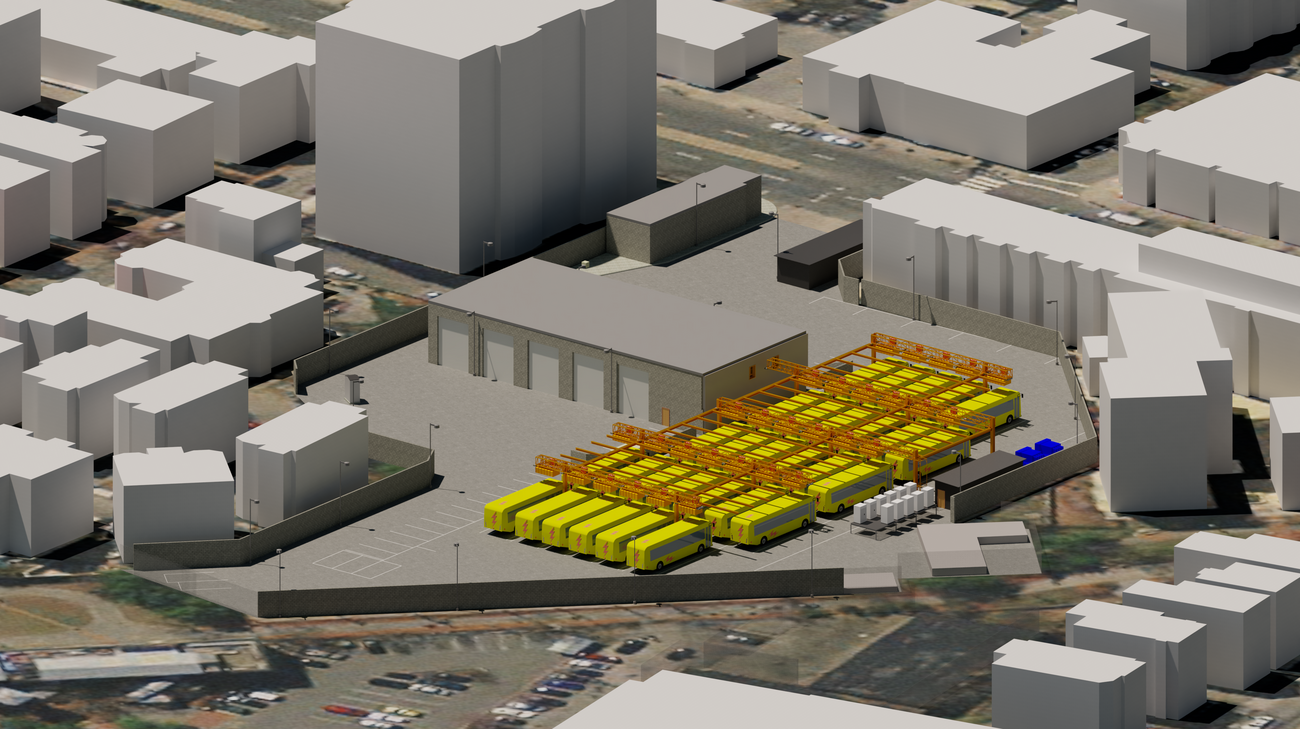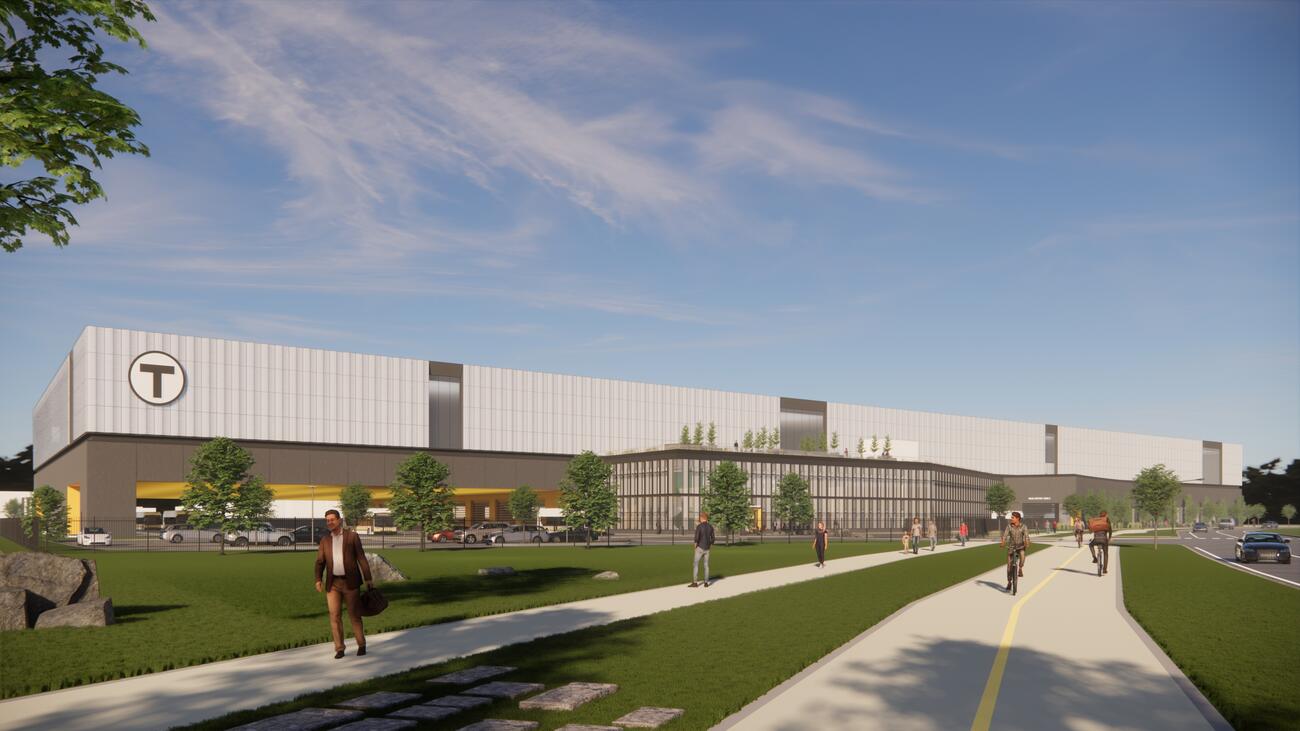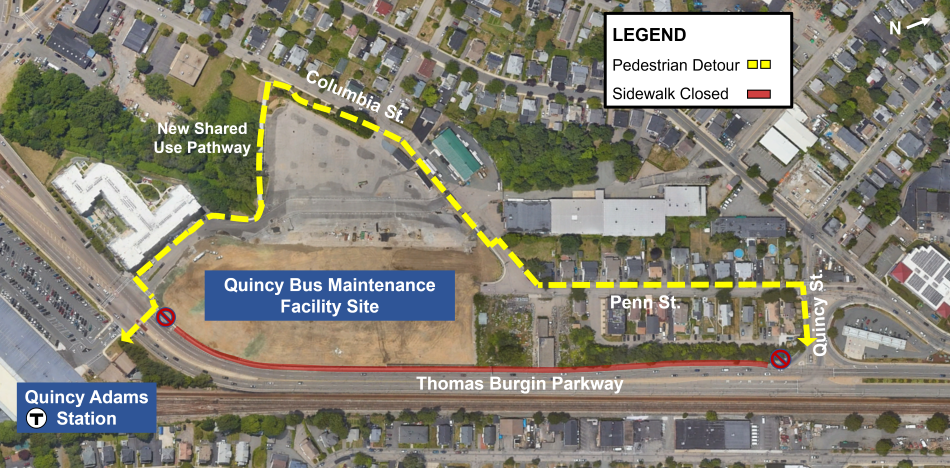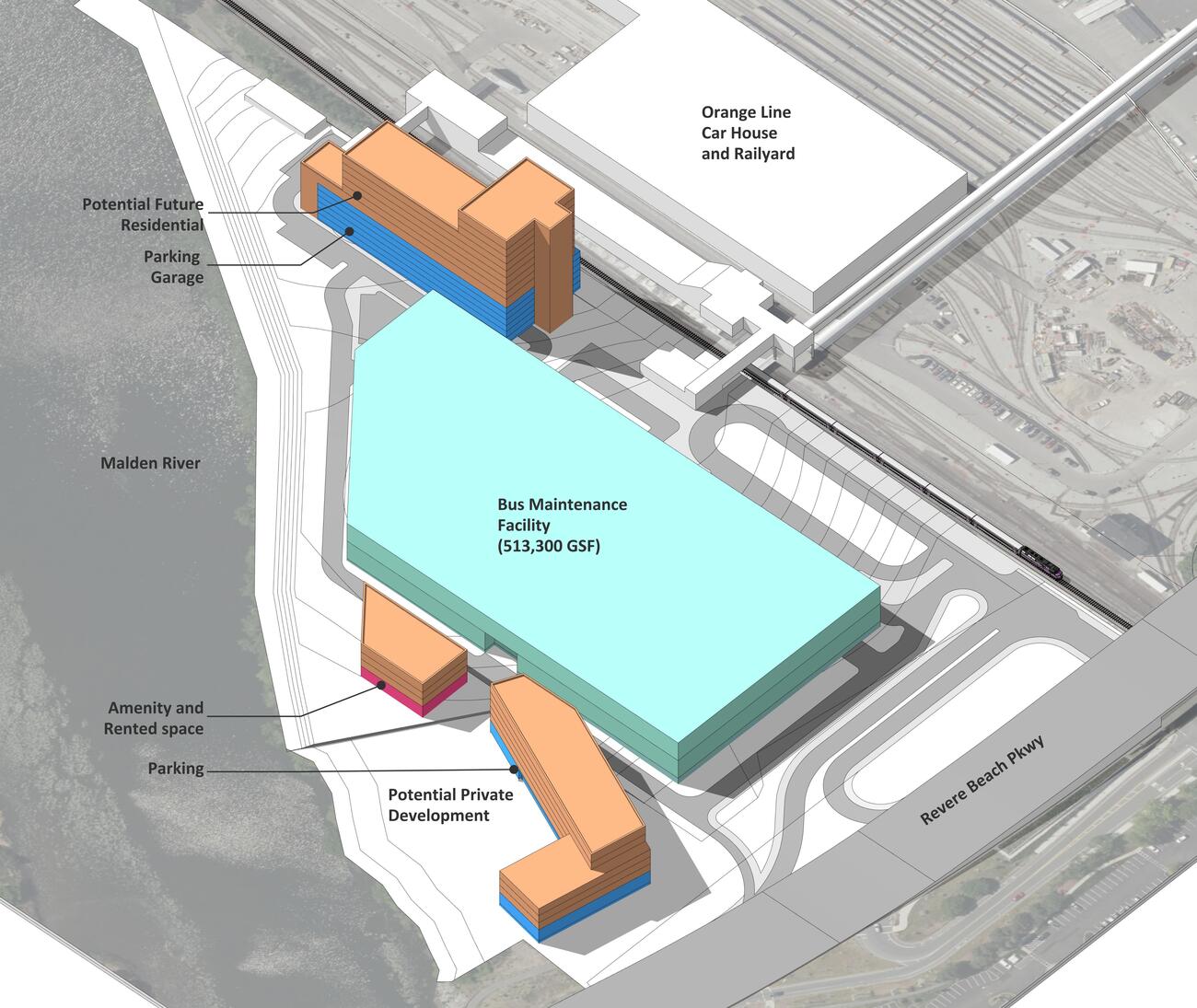Bus Facility Modernization

- Timeline: Ongoing
- Status: Construction (Quincy) | 15% design (Arborway)
We have a long-term plan to fully replace our bus fleet with battery electric buses (BEBs). These all-electric vehicles emit no greenhouse gases, allowing the MBTA to significantly reduce our carbon footprint. A newer, emissions-free fleet will let us provide more sustainable, equitable, reliable, and convenient service to riders—all initiatives of our comprehensive Better Bus Project.
To provide operational support for an enlarged and upgraded fleet, we need to improve our bus facilities. The Bus Facility Modernization program will allow us to provide our riders and employees with major benefits, including:
- More service during peak demand times
- Larger, roomier buses on some routes
- Cleaner air along bus routes and in maintenance facility neighborhoods
- Modern, efficient work environments for our employees
- More sustainable, resilient, and environmentally friendly infrastructure
We’re prioritizing facility upgrades along some of our busiest routes in areas where residents are heavily reliant on transit. These riders will be among the first to experience improved bus service and benefit from new zero-emissions vehicles.
Learn how modernizing bus facilities helps lower our carbon emissions
Building a Better T
As part of our $9.6 billion, 5-year capital investment plan, we're renovating stations, modernizing fare collection systems, upgrading services for our buses, subways, and ferries, and improving the accessibility of the entire system.
Our Plan for Modernized Facilities
Today, the MBTA operates a fleet of 1,100 buses from nine bus maintenance facilities across the network. The planning, design, environmental review, and construction of fully modernized facilities will require significant resources and multiple years to implement.
In April 2021, we presented to our plan to modernize the bus fleet and bus maintenance facilities. The plan defines:
- A goal of fully electrifying the fleet by 2040
- A prioritized path for facility replacements based on equity, ridership, and bus fleet and facility condition
- The scale of investment required to support new facility construction, including real estate purchase costs
We are prioritizing the modernization of certain facilities before others based on rider, worker, and community needs and the bus system's logistical requirements.
Buses serve a greater share of minority and low-income riders than any other mode, and the routes from some garages serve higher proportions of these populations than others.
To help us provide improved transit and environmental benefits to riders in these areas, our plans prioritize upgrades that will improve service and air quality in transit-critical communities and neighborhoods surrounding bus facilities.
Larger facilities will also allow us to operate more 60-foot buses, which will increase the number of riders served.
Some of our facilities can only accommodate older buses nearing the end of their service life. These vehicles must be replaced, but first we need to retrofit or rebuild the facilities that service them.
Outdated facilities create challenging working conditions for our employees, have greater noise and visual impacts on surrounding communities, and are more costly for the MBTA to maintain.
We plan to rebuild our three core facilities (Charlestown, Cabot, and Southampton) in their current locations. We will replace these last so that we can move their buses to facilities where we’ve already expanded capacity. We will maintain regular bus service during construction.
For facility expansions that require building in new locations, we'll work with local utility companies to determine where to install the necessary charging infrastructure to serve our needs cost-effectively and efficiently.
As we update facilities and purchase new buses, we will continue to refine our plan and share updates with riders.
Quincy Bus Maintenance Facility
As the oldest facility in our system, the Quincy Bus Maintenance Facility lacks the required technology and space to support newer buses. Because only older buses can run from this garage, Quincy routes experience limited service frequency and more reliability issues.
We’re constructing a new facility for a larger, more modern fleet. This will accommodate BEBs and allow for potential service expansion in the future while supporting our efforts to lessen our environmental impact. The new facility will be located across the street from Quincy Adams Station on the Red Line, within a mile of Quincy Center Station, where many Quincy bus routes start.
Construction activities
We have selected a construction manager (CM), and construction of the new bus maintenance facility is underway.
Crews have begun construction activities next to and within the new bus maintenance facility site, including:
- A new sidewalk along Burgin Pkwy
- Work along Columbia St and Penn St related to extending Columbia St to Burgin Pkwy
- A new intersection with signals
The site is located at 599 Burgin Pkwy in Quincy.
Site preparation and enabling activities, including construction of a new shared use pathway, and utility work were performed in 2022.
What to Expect During Construction
Beginning mid-November 2023, the sidewalk along Thomas Burgin Pkwy from Quincy St to the Deco Apartments driveway will be closed to pedestrians. Detour signs will direct pedestrians through Quincy St, Penn St, Columbia St, and the new shared use pathway. We expect this detour to last for about eight months.
Additionally, there will be a temporary traffic lane closure every day along the southbound side of Thomas Burgin Pkwy, next to the bus maintenance facility site. The lane will be closed during the daytime.
Public engagement
Now that the environmental review process and the design review phase are complete, and construction activities have begun, we encourage the public to view past public meeting presentations and submit any comments or questions to quincybus@mbta.com.
We presented our initial design concept during a public meeting in January 2020. Based on feedback, we shared updated information on our plans during public meetings in June 2020, December 2020, and November 2021.
View the June 2020 meeting presentation
Plans for the MBTA Quincy Bus Facility are undergoing review as part of the state environmental permitting process. To initiate this process, we submitted an Environmental Notification Form (ENF) to the Massachusetts Environmental Policy Act (MEPA) Office.
On September 21, 2020, MEPA hosted a virtual session with the MBTA to describe the proposed project, potential impacts and mitigation, and answer questions.
You can review the information submitted to MEPA in response to public comments and questions about:
- The MBTA's plans for testing BEBs
- Supplemental information regarding stormwater management, floodplains, and wetland resource areas
- Responses to several questions from the City of Quincy regarding transportation and other impacts
Public comment was accepted from September 29 to October 27, 2020.
On November 6, MEPA issued a certificate on the Environmental Notification Form signifying that this project does not require an Environmental Impact Report (EIR).
The MBTA also completed the National Environmental Protection Act (NEPA) process for the project. In December 2020, the Federal Transit Administration (FTA) issued a categorical exclusion for the projects, as it will not have significant environmental impacts. This finding means the federal environmental review is complete and the project does not need to complete an Environmental Impact Statement.
Arborway Bus Maintenance Facility
To support a 100% BEB fleet and advance the MBTA's decarbonization initiatives, we're designing a larger Arborway Bus Maintenance Facility. The facility will be located next to the existing one at Washington Street and Arborway in Boston, near Forest Hills station.
Today, the Arborway garage supports buses serving routes in neighborhoods with high proportions of transit-critical riders from low-income households and households of color in Roxbury, Dorchester, Mattapan, Hyde Park, Roslindale, Jamaica Plain, and areas southwest of Boston. The new, larger facility will support 60-foot BEBs that will serve more routes and reduce crowding in these areas.
The new Arborway facility is targeted to open by the end of 2027. As existing compressed natural gas (CNG) buses are retired starting in 2028, the new facility can start replacing them with zero-emissions BEBs.
Public engagement
Attend upcoming events for project updates.
In October 2023, MBTA project staff and representatives from the City of Boston provided an overview up a revised approach to 15% design for the new bus maintenance facility and electrification project, based on the feedback heard at the meeting in June.
View the October 2023 meeting presentation
In June 2023, MBTA project staff provided an overview of the 15% design plans for the new bus maintenance facility and electrification project.
View the June 2023 meeting presentation
We presented our initial design concept during a public meeting in December 2021.
View the December 2021 meeting presentation
The MBTA has also coordinated on the project with important stakeholders including the City of Boston, Department of Conservation & Recreation, the Emerald Necklace Conservancy, Boston Water and Sewer Commission, and Eversource.
In addition to MBTA-led public meetings, the team has provided updates at meetings of local community organizations interested in the project:
- JPNC - Arborway Yard Committee Update – 5/22/23
- Emerald Necklace Conservancy Update – 4/6/23
- Emerald Necklace Conservancy Update – 2/10/23
- Stonybrook Neighborhood Association – 1/9/23
- JPNC – 6/28/22
- Emerald Necklace Conservancy Update – 6/23/22
- WalkUP Roslindale – 5/17/22
- Emerald Necklace Conservancy Update – 5/9/22
- Emerald Necklace Conservancy Update – 3/30/22
- Stonybrook Neighborhood Assn – 3/14/22
- Greater Ashmont Main Streets – 3/2/22
- Greater Mattapan Neighborhood Council – 2/7/22
- Jamaica Plain Neighborhood Council (JPNC) - 9/28/21
Upcoming Modernization Projects
We’re moving forward with a number of other initiatives to address urgent needs at existing facilities. We are also planning to modernize other facilities following our renovations at Quincy and Arborway.
Facility retrofits
We will continue to provide full bus service for riders during our facilities' design, renovation, and construction. We’re retrofitting some existing facilities and, when necessary, we’ll temporarily move some buses to alternate facilities in order to maintain bus service on all routes. The MBTA is making targeted investments to continue to meet operational needs while cost-effectively managing time-sensitive fleet replacements.
Like Quincy, the Albany Bus Maintenance Facility was only able to accommodate the oldest diesel buses due to insufficient vertical clearance. A targeted $2 million investment in reconstructing garage doors alleviated this problem, allowing Albany to accommodate newer hybrid buses until it is replaced with a BEB facility.
North Cambridge serviced the MBTA’s now retired fleet of electric trolleybuses, which were the oldest buses in our system. The system-wide transition to BEBs will allow the North Cambridge fleet to maintain the same buses as the rest of the fleet. This will reduce operating costs and improve operating efficiency and reliability.
We are currently retrofitting the facility to service BEBs. Construction has begun, and the next major construction activity is the installation of drilled shaft foundations to support the steel gantry structures. These structures will support the overhead bus charging equipment. The Contractor, J.F. White Contracting Company, is starting this work on April 1, 2024. This activity is expected to be completed in approximately four weeks. Work will occur during normal work hours, Monday to Friday. Final completion of the retrofit is expected in late 2025.
The Southampton Bus Maintenance Facility houses our Silver Line buses, as well as the 60-foot buses that operate on Routes 28 and 39. We're expanding parking space at the facility to accommodate delivery of additional buses in summer 2022.
Upcoming future facility improvements
We are prioritizing the modernization of our bus maintenance facilities based on equity, ridership, and bus fleet and facility condition. We plan to open updated Wellington and Lynn facilities by 2030, and the remaining facilities every two to three years between 2030 and 2040.
We plan to build a BEB maintenance facility at Wellington to service and accommodate 200 buses. The new facility would replace the existing facility at Fellsway and absorb the Chelsea and East Boston routes from Lynn.
This project is currently in conceptual design and early planning. We expect to begin the design process in late 2022.
We plan to build a BEB maintenance facility in Lynn to house 65 buses. The new facility would replace the existing facility in Lynn and operate routes that serve Lynn and the North Shore. We are working with local partners to evaluate locations for this facility, and expect to open it in 2030.
We plan to consolidate the Albany and North Cambridge facilities in a single new location because their routes are close to each other.
The size and location of the new facility will be determined once the bus network redesign is complete, and post-pandemic ridership trends are evaluated. This process will ensure that we can meet the new network’s operational needs.
We plan to rebuild the Southampton Bus Maintenance Facility on the existing site to maintain the operational benefits of its location within the core of our network. We’re currently conducting early planning for this renovation.
We plan to rebuild the Cabot Bus Maintenance Facility on the existing site to maintain the operational benefits of its location within the core of our network. The site is also key to the operation of the Red Line, signals, and training facilities. We’re conducting early planning for this renovation, and coordinating with MBTA and non-MBTA projects adjacent to the facility to ensure consistency with the bus facility’s needs. We'll develop a master plan for the site in coming years.
We plan to rebuild the Charlestown Bus Maintenance Facility on its existing site to maintain the operational benefits of its location within the core of our network. In addition to housing our largest bus maintenance facility, the Charlestown campus includes the shops, storage, and support spaces needed for the maintenance staff who care for our tracks, power infrastructure, and stations.
In September 2021, the MBTA completed a master plan for the entire campus documenting the layout for all facilities. We are coordinating with the City of Boston to ensure that the redesign of Sullivan Square and Rutherford Avenue are consistent with the operational needs outlined in the master plan. We’ll begin the preliminary design of these facilities in coming years.
Project Renderings

The retrofit of the North Cambridge facility to accommodate charging infrastructure will support the first significant roll out of battery electric buses in the MBTA system.

The first of the new facilities, the Quincy bus maintenance facility will be state-of-the-art, all-indoor, and house up to 120 battery electric buses. Modern features will improve working conditions for MBTA staff and support fleet reliability.

A rendering of the future Arborway bus maintenance facility. Replacing a mostly outdoor CNG facility with an all-indoor multi-level facility for 200 battery electric buses allows the MBTA to modernize its fleet, improve working conditions, and create a parcel of transit-oriented land for future development.
Past Events
Contact Us
For all questions and comments related to the Bus Facility Modernization program or the Quincy or Arborway Bus Maintenance Facility improvements, please contact Scott Hamwey at shamwey@mbta.com.
Recent Updates
Related Projects
Building a Better T
As part of our $9.6 billion, 5-year capital investment plan, we're renovating stations, modernizing fare collection systems, upgrading services for our buses, subways, and ferries, and improving the accessibility of the entire system.




